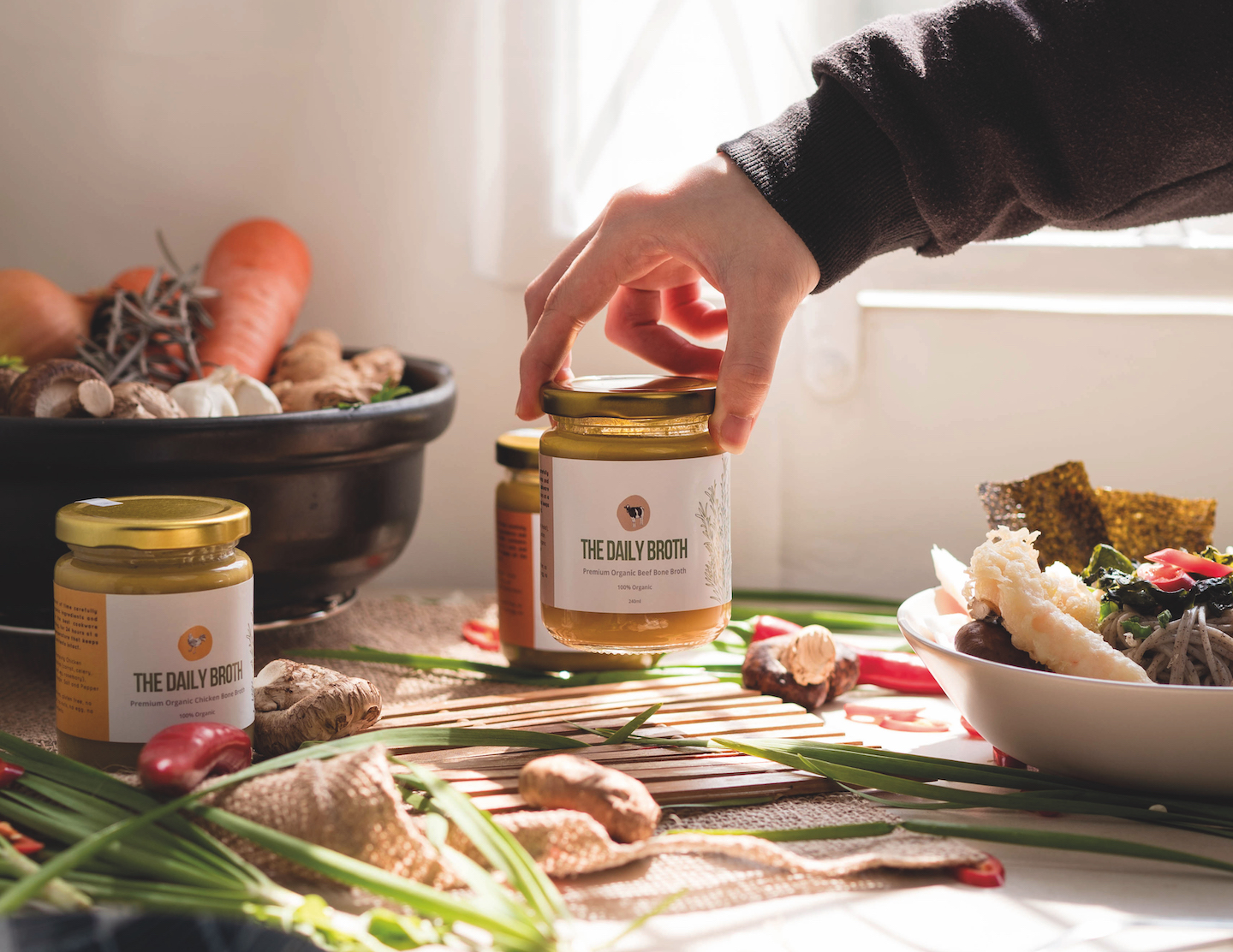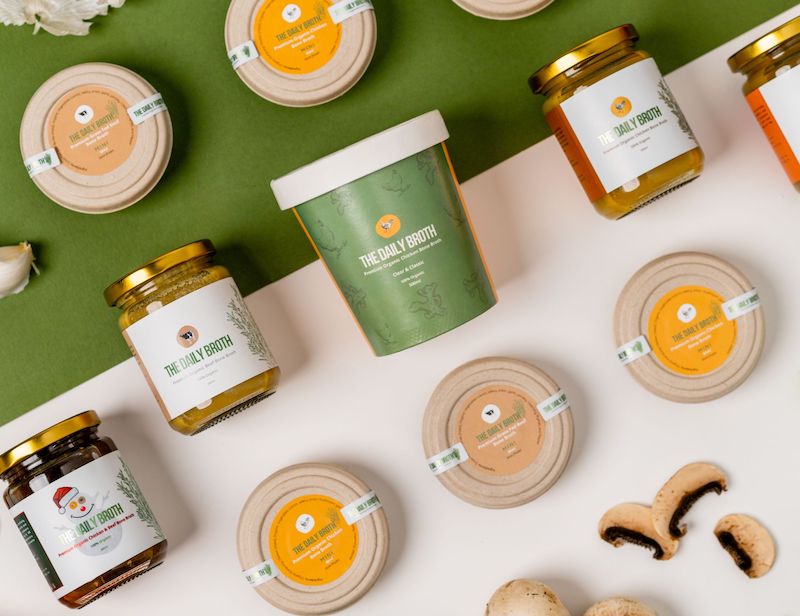
The Daily Broth boils fresh vegetables, such as onions, carrots, celery, garlic, parsley and thyme for 24 to 48 hours with chicken or beef (Photo: The Daily Broth)
A couple’s measured approach to boiling something tasty and healthy bubbled from hobby to business during the pandemic. Many ingredients go into their pot, just as different factors inadvertently prepped them to set up The Daily Broth.
While researching remedies for picky eaters in 2020, Rahayu Permatasari came across bone broth. As her husband liked to cook, she asked him to figure out something for their very fussy two-year-old. Tengku Arif Asaad did just that after various attempts and the boy liked it.
When a friend had gut issues, they suggested that he try their product. “We gave jars to family and friends who [offered] good feedback and asked, ‘Why don’t you sell it?’ So we created an Instagram account. That was how we began,” Ayu says.
Bone broth is commonly consumed in the UK and US as it supports overall health and well-being. “It’s like drinking chicken soup and can be taken daily, hence our name. But what we find here usually comes in a packet and has preservatives, so we decided to make our own.”
Asaad likes being in the kitchen trying out recipes from YouTube.“During Covid, I cooked every day because we couldn’t go out.”
While studying in Australia, he would phone his mother, a very good cook, every day to ask for recipes. “She never wrote down anything; it was always a bit of this and that, and I just had to figure things out. From there, I started experimenting.”
tengku_asaad_and_rahayu_permatasari_the_daily_broth.jpg

He and Ayu are foodies who enjoy watching cooking shows for ideas. They like to try different foods and check out new restaurants when travelling.
Six months into their “side business”, the pair, now married for eight years, knew it needed their full attention to go further. Asaad quit his job at a bank, where he handled procurement. Ayu, who did marketing for an oil and gas company, took a sabbatical at first, then resigned in 2022.
“We decided to take this big jump and do it together because, if not, someone else would do so,” she says.
Initially, they did not think of segregating work duties. “Everything overlapped and we would gaduh every day: ‘You didn’t do this … you didn’t do that.’ Then we aligned. I now handle operations and she takes care of customers and sales,” Asaad says. “It was hard working together in the beginning because we have similar traits. If I want something done, it has to be done now.”
“I am the same,” Ayu adds.
But they have learnt to capitalise on their strengths and things are now smoother. “He’s detail-oriented, looking at numbers and spreadsheets. I like [having] vision — where the company needs to go — and he executes it.”
The Daily Broth boils fresh vegetables, such as onions, carrots, celery, garlic, parsley and thyme for 24 to 48 hours with chicken or beef. The concoction is then packed in 210ml jars and immediately placed in a blast freezer to bring down the temperature fast.
“It goes to the customer in a frozen state and you double boil or heat it up before drinking. Some people add pasta or noodles to make the broth more filling. We cook it at a certain temperature to retain all the nutrients in the organic ingredients.”
subscription-crop.jpg

They experimented with different cookware, from slow cookers to clay and stainless steel pots, and found that titanium-glazed ones worked best.
“Flavour-wise, broth boiled in titanium pots tastes best. We sent samples to the lab and the one which showed no trace of chemicals was cooked in that. Chemicals can leach from certain utensils when you are boiling on high heat for long hours,” Ayu says.
They started out in their Kuala Lumpur home kitchen with a single 2.5-litre electric pot — a gift from Asaad’s mother — that can fill 10 jars. People asked, why not get something bigger and produce more at one go?
“We believe cooking the broth in a smaller pot makes it easier to control the quality. We also customise orders. A lot of children have eczema or allergies, and adults have gut issues. Some cannot take garlic or pepper, or they don’t want carrots or mushrooms for their pets. So we remove these ingredients.”
The brand now has seven flavours of broths and customising is a selling point, Asaad says. But clients have to take a minimum of 10 jars for modified orders.
There is also a vegan broth with vegetables, shitake mushrooms and miso, and a clear version boiled with just chicken that can serve as a soup base for cooking. An 80ml bottle with no salt and pepper is available for babies.
In the early days, the duo produced 15 pots of broth daily. But there were issues with power supply, so they shifted to a bigger place and sectioned off the kitchen. Even so, they could only manage about double that number every day. At end-January this year, they relocated to a small factory in Balakong, Selangor, and production has increased to 60 pots.
“We moved because we are very serious about this. We see a market for our products and want to get certification for what we are doing. From the start, we’ve been sending our broth, which contains a lot of protein, to babies and people who are not well. We have an internal lab in our factory and have food scientists working with us.”
Saying a vehement no to preservatives and suggestions to can or pasteurise means they have to employ a more complicated process of making their broth. “We experimented by raising the temperature to sterilise it and prolong shelf life. But that alters its taste. When that happens, what people usually do is add flavouring. We obviously don’t want to do that, although it is more commercially attractive.”
Their factory has the capacity to produce up to 200 pots daily, ideal for their next goal: export and expand from B2C to B2B. There is potential in the latter, they think, and are looking at confinement centres, senior homes and medical facilities, among other places.
They have begun talking to people and are trying to get all the necessary licences. Plans to reach out beyond the Klang Valley and have stockists in other states are in the pipeline.
“There are many things we can do down the road, like turning our stock into something else or coming up with a more complete meal,” Asaad says.
“A lot of people think you can [become] an entrepreneur immediately,” Ayu adds. “I’m quite old-school: I believe you have to work for others first. We did that for a long time and it’s such a good, humble way to understand the full chain of business. Then you can make more informed decisions.”
Asaad agrees. “When you work with others, you see how things are done and know what to look out for. It is easier to manage costs. If I hadn’t worked anywhere else, I would just be going in blind.”
By the way, their son Aimar still enjoys drinking his broth daily “because daddy makes it”.
This article first appeared on Sept 30, 2024 in The Edge Malaysia.


